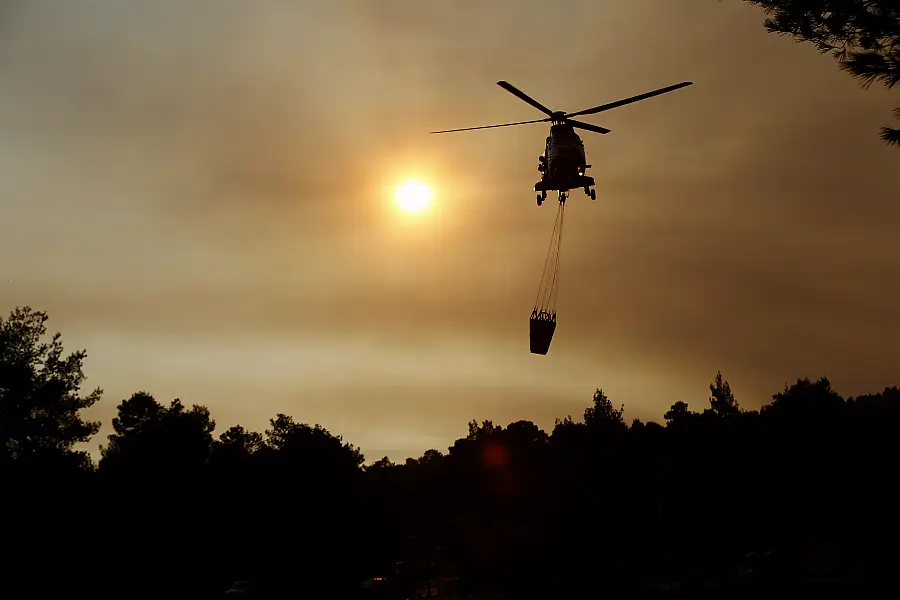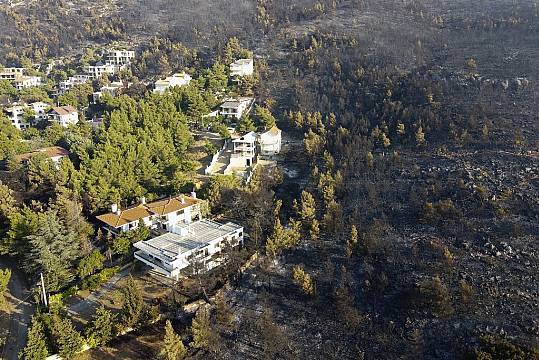Hundreds of firefighters, backed by planes, helicopters and reinforcements from other countries, battled massive wildfires that continued burning in Greece on Sunday, fuelled by bone-dry conditions after the country’s worst heatwave in decades.
Authorities dedicated the most resources to tackling four major blazes – one, on Greece’s second-largest island of Evia, that has burned for five days, cutting across the island from coast to coast and isolating its northern part; and three in the southern Peloponnese region.
A fifth dangerous fire just north of Athens appeared to be on the wane, after burning dozens of homes and businesses in the Greek capital’s northern suburbs, triggering the evacuation of thousands of people and decimating large tracts of forest, including in the Mount Parnitha national park, one of the last forests near Athens.

One volunteer firefighter died in that blaze after suffering a head injury from a falling electricity pole. At least 20 people have been treated in hospital for fire-related injuries, including two firefighters who were in intensive care.
The causes of the fires are under investigation.
Three people were arrested on Friday — in the greater Athens area, central and southern Greece — on suspicion of starting blazes, in two cases intentionally.
Another person, a 47-year-old Greek, was arrested on Saturday afternoon in the Athens suburb of Petroupoli for lighting two fires in a grove and setting four large rubbish containers on fire, police said.
Between Saturday night and Sunday, Greek coast guard vessels and ferries evacuated 83 more people from beaches in northern Evia.

Authorities urged the residents of four villages in north Evia to evacuate.
On Friday night, more than 1,000 people were evacuated from the island by sea as flames raged on the hillsides behind them, cutting off other means of escape.
Local officials and residents in north Evia called in television news programmes on Saturday, appealing for more firefighters and water-dropping planes as the fire that broke out Tuesday afternoon raced north towards villages. The blaze has obliterated vast swathes of forest and burned scores of homes on the island of rugged mountains popular with holidaymakers and campers.
The fire department said 575 firefighters with 35 ground teams and 89 vehicles were battling the Evia wildfire, including 112 Romanian and 100 Ukrainian firefighters sent to Greece as reinforcements. Four helicopters and three planes, including a massive Beriev-200 plane leased from Russia, provided air support.
Ten countries have already sent personnel and firefighters equipment such as aircraft to Greece, while another eight are sending further reinforcements.

Greek Prime Minister Kyriakos Mitsotakis visited the fire department’s headquarters in Athens on Saturday and expressed his “deep sadness” at the volunteer firefighter’s death.
He later visited the airport from which firefighting planes take off and thanked the pilots, both Greek and French.
Securing aid for everyone affected by the wildfires will be “my first political priority”, he pledged, promising that all burnt areas will be reforested.
“When this nightmarish summer has passed, we will turn all our attention to repairing the damage as fast as possible, and in restoring our natural environment again,” Mr Mitsotakis said.
Greek and European officials have blamed climate change for the large number of fires that burned through southern Europe in recent days, from Italy to the Balkans, Greece and Turkey.
Massive fires also have been burning across Siberia in northern Russia for weeks, forcing the evacuation on Saturday of a dozen villages. In all, wildfires have burned nearly 15 million acres this year in Russia.
In the US, hot, bone-dry, gusty weather has also fuelled devastating wildfires in California.







